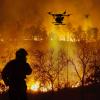
As wildfires become more frequent and severe due to climate change, it’s important to address the unequal distribution of wildfire risk in communities. A 2023 IIASA study calls for more integrated and inclusive wildfire risk management approaches and proposes a novel framework mapping different justice aspects.
While justice considerations are commonly explored in the management of other hazards like floods and hurricanes, wildfire risk management has received less attention. In their study, researchers from the Equity and Justice Research Group of the IIASA Population and Just Societies Program, advocate for three domains of justice to be incorporated into wildfire risk management to proactively address potential new conflicts across stakeholder groups: distributional, procedural, and restorative justice.
The proposed framework categorizes these dimensions across the four phases of wildfire risk management: prevention, preparedness, response, and recovery or adaptation. It highlights the challenges and trade-offs that arise, emphasizing the need for inclusive approaches that address social, economic, cultural, and ecological dimensions.
Furthermore, the framework underscores the urgency of operationalizing just approaches amid evolving wildfire risk contexts and escalating climate change mitigation efforts. Connecting these strategies to the Just Transition discourse ensures that all communities, workers, and social groups are considered in the transition to a net-zero future.
In addition to identifying justice aspects, the framework also provides a foundation for inclusive governance practices. Integrating diverse justice considerations paves the way for more holistic and equitable wildfire risk management strategies essential to navigating the challenges of a changing climate.
Further info:
Schinko, T. , Berchtold, C., Handmer, J., Deubelli, T. , Preinfalk, E., Linnerooth-Bayer, J., Scolobig, A., Serra, M., & Plana, E. (2023). A framework for considering justice aspects in integrated wildfire risk management. Nature Climate Change 13 788-795. 10.1038/s41558-023-01726-0.
